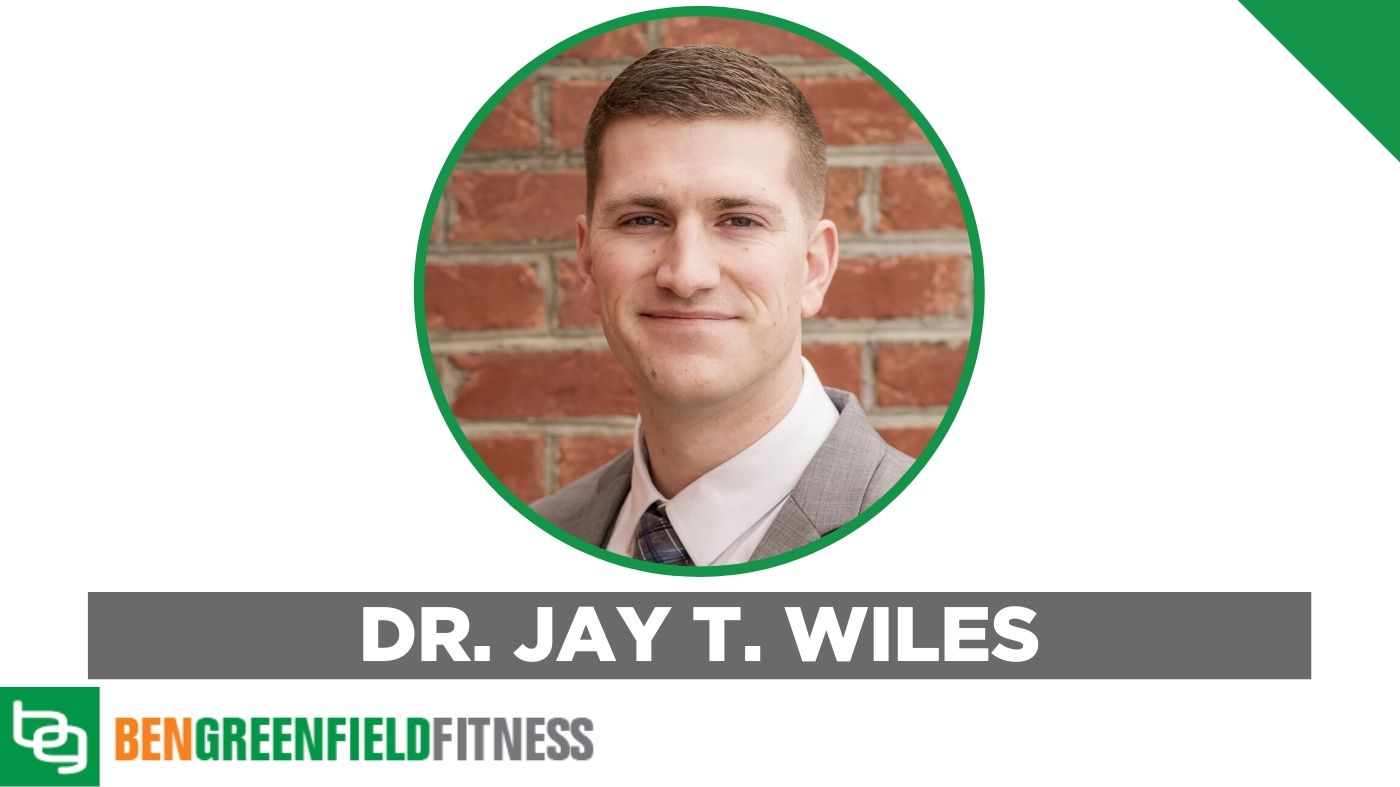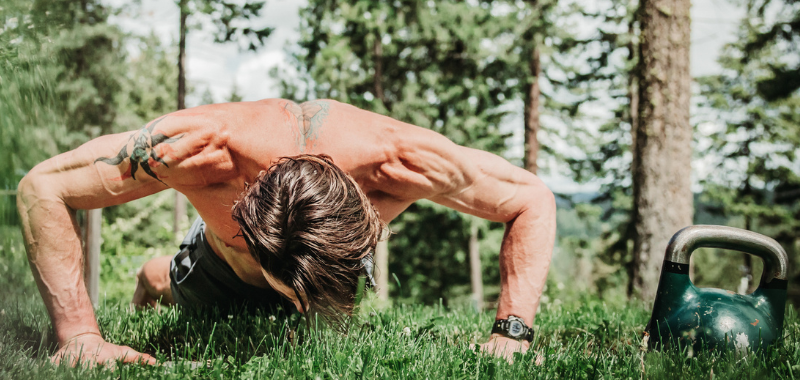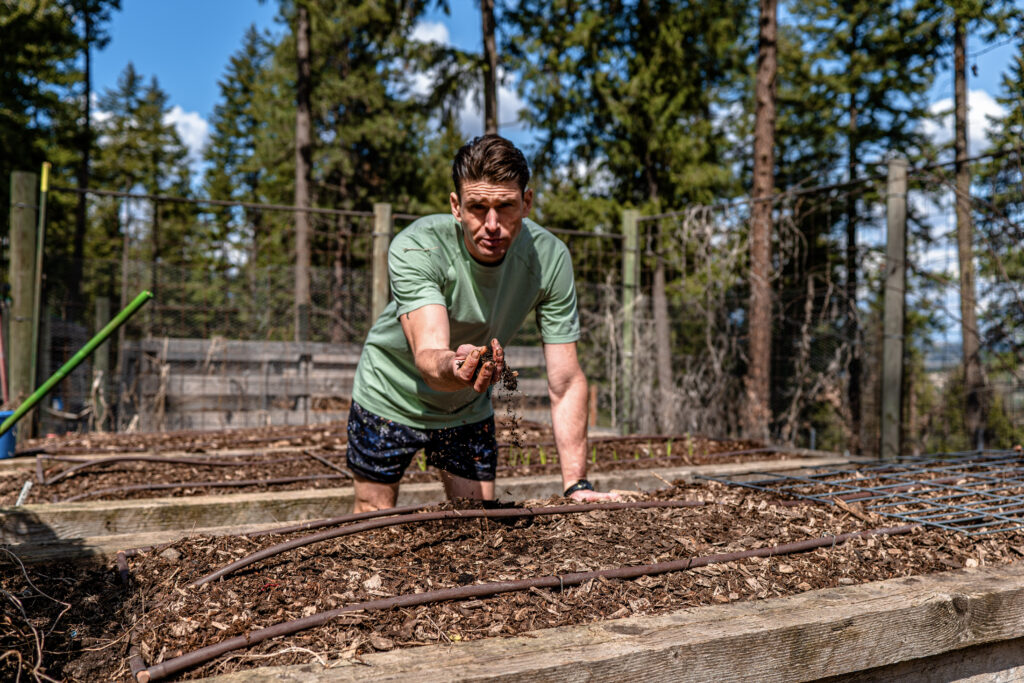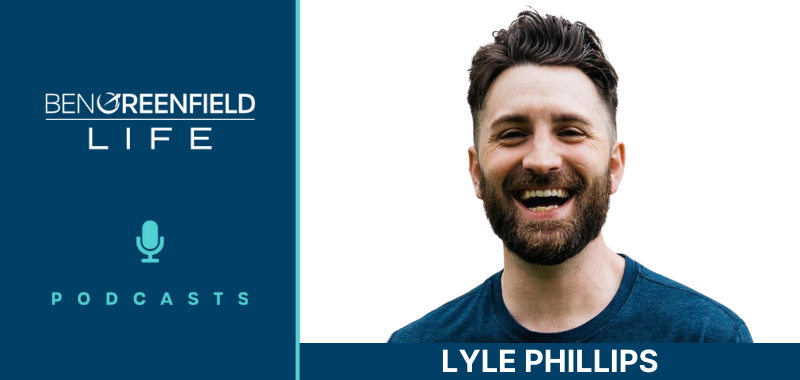March 5, 2020
If you've been a long-time podcast listener, then you're no doubt familiar with Dr. Jay T. Wiles, my jolly sidekick on the regular Ben Greenfield Fitness Q&A podcast episodes.
What you may not know about Dr. Wiles is that he is a true expert in all things heart rate variability (HRV) testing, tracking, and interpretation; and in this podcast episode, he takes a deep dive into how to use HRV to optimize your recovery, performance, sleep, stress, and nervous system.
Dr. Wiles is a clinical health psychologist with a passion for helping others reach their full potential from an integrative and holistic perspective. With this strong passion for integrative and holistic care, especially in nutrition and psychophysiology, Dr. Wiles completed his doctor of clinical psychology degree at Regent University with a specialized focus and concentration in health psychology. Dr. Wiles then furthered this specialty in health psychology as a pre-doctoral intern at McGuire VA Medical Center in Richmond, VA and post-doctoral fellowship at WJB Dorn VA Medical Center in Columbia, SC. He currently works as a health psychologist for the Department of Veteran Affairs.
With specialized training in health behavior coaching, health assessment, nutritional interventions for mental and physical health, motivational interviewing, applied psychophysiology (biofeedback and neurofeedback) and consultation, Dr. Wiles works as a consultant for companies, organizations, practitioners, and individual patients on nutritional psychology, health behavior change, applied psychophysiology, and health promotion/disease prevention via complementary and integrative practices. He is also board certified in biofeedback and heart rate variability biofeedback as well as board-certified in Tai Chi for rehabilitation.
Dr. Wiles has worked closely with elite athletes and executives on enhancing peak performance through his online consulting agency, Thrive Wellness and Performance. This consulting agency focuses solely on training and regulating psychophysiology for performance.
He is passionate about education and consultation with patients and organizations in an effort to increase health outcomes through focusing on prevention and well-being, as opposed to disease and symptom mitigation.
During this solosode with Dr. Jay, you'll discover:
-Jay's background and a brief overview of “biofeedback”…7:16
- Biofeedback: the use of your physiology to enhance self-awareness in order to promote self-regulation
- Like learning an instrument: perform an action, observe the results, repeat until the desired result has been met
- HRV is the most fundamental building block of biofeedback
- Thrive Wellness and Performance website
- Drjaywiles.com
-Research on the use of HRV as a metric and HRV Biofeedback…11:43
- Wellness, Performance, Recovery, and Mental Well-being
- Robust research on HRV began only 20-30 years ago
- HRV is linked to heart attacks, strokes, physical performance
- Optimized recovery, sleep, homeostasis of nervous system, and much more…
- Higher stress (real or perceived) resulted in lower HRV scores
- Association for Applied Psychophysiology and Biofeedback (AAPB)
-Overview of Psychophysiology…18:46
- Central Nervous System and Peripheral Nervous System
- Autonomic Nervous System
- Parasympathetic Versus the Sympathetic Response
- Autonomic Balance
- Baroreflex Response
- Acetylcholine Response
- BGF podcast w/ Dr. Koniver on cortisol
- Book: Why Zebras Don't Get Ulcers by Robert Sapolsky
-What Is Heart Rate Variability…39:55
- PPG vs. ECG
- Metric of resiliency to change
- Sources of HRV
- Respiratory Sinus Arrhythmia (RSA)
- Autonomic Balance
-Metrics of Heart Rate Variability…49:19
- Defining different domains
- Time domain
- SDNN
- RMSSD
- HR Max-HR Min or heart rate amplitude
- Frequency Domain
- ULF
- VLF
- LF/HF Ratio
-HRV Norms…1:12:00
- Defining Norm-based HRV comparisons
- High vs. Low HRV
- Voss 2015 Norm Study of Gender and Age
- Values for all norms found in 21,000 participants
- Norm vs. Individual baseline comparisons
-HRV Training/Regulation…1:23:45
- Resonance Frequency Training
- Effortless, low and slow, diaphragmatic breathing
- Patrick McKeown style breathing (Book: The Oxygen Advantage)
- Use of Wearable technology for biofeedback
- Pros and Cons
- Different Devices:
- Whoop Band
- Biostrap
- Polar H7 Strap w/ Elite HRV or Nature Beat App
- Dr. Wiles’ favorite device: Lief Therapeutics
- Pitfalls of Wearables
- Artifact: Ectopic or false beats
- Many devices do not remove these in their data inclusion
- Book: The Oxygen Advantage
-HRV Hacks…1:42:00
- Cold Exposure:
- Hot/Cold Contrast showers
- Cold Plunges/Immersion
- Cold when sleep (core body temp)
- Exercise
- Mindfulness and Compassion Exercises
- Dietary Considerations
- Fasting
–Stephen Porges' Polyvagal Theory…1:51:09
-And much more…
Click here for the full written transcript of this podcast episode.
Resources mentioned in this episode:
- Oura Ring
- BGF podcast w/ Dr. Koniver on cortisol
- Book: Why Zebras Don't Get Ulcers by Robert Sapolsky
- Whoop Band
- Biostrap
- Polar H7 Strap w/ Elite HRV
- Nature Beat App
- Lief Therapeutics (code GREENFIELD for 20% off their first month of subscription or full purchase of the device)
- Book: The Oxygen Advantage
- The Christian Gratitude Journal
- Book: The Polyvagal Theory by Stephen Porges
Episode sponsors:
–Kion Flex: The ultimate recovery formula, Kion Flex is a bioavailable blend to support joint comfort, mobility and flexibility, and bone health. Ben Greenfield Fitness listeners, receive a 10% discount off your entire order at Kion when you use discount code: BEN10.
–X3 Bar: Grow muscle 3x faster than you can with free weights! The X3 Bar will change the way you train forever. Get a $50 discount off your X3 bar when you use discount code: BEN
–JOOVV: After using the Joovv for close to 2 years, it's the only light therapy device I'd ever recommend. Give it a try: you won't be disappointed. Order using my link and receive my brand new book, Boundless absolutely free!
–Seed Daily Synbiotic: A formulation of 24 unique strains, each of which included at their clinically verified dose, to deliver systemic benefits in the body. Save 15% off your order when you use discount code: BEN15














Great podcast! And tons of helpful information. I track HRV regularly with several of the devices you mentioned but not yet with the Lief device although it’s now on my list :). One of the most intriguing things I took away from your podcast Dr. Wiles was the mention of how we all have a set number of breaths we’re designed to take in. Could you help give me an idea how I could accomplish finding out my own optimal number of breaths per minute? Thank you so much!!!
Good morning Dr Jay and thank you(and Ben) for that great podcast.
I had a very long travel (45 hours door to door, 7 time zones, couple hours of sleep, kids, drink during the flight…) and also went from my home at sea level to a mountain place at 1300m altitude. My RHR stayed ok but my HRV plummeted. It’s been 6 weeks and no recovery. Is that normal that it takes so long? i do biohacks, train regularly, good sleep…thank you.
Wasn’t there a discount code for the Oura Ring through this podcast? Thanks!
Nice and thorough; however autonomic ‘balance’ is poor teaching term because it implies the ANS is a linear system. This is fostered by the performance world excessive use of the misleading LF/HF ratio (Billman 2013). This ratio controversy will die. Consider siting a teaching concept ‘Left Foot Braking of the ANS’ (Gharbo & Ginsberg 2016).
https://www.anshealth.co/post/left-foot-brakin
Hi Ron,
Agreed. It is most commonly used, which is why I provided it, at this time. You may have missed it, but I also provided the brake metaphor. I believe Jack Ginsberg introduced us a while back (I worked with Jack in Columbia).
I enjoyed the podcast. I have had a ventricular tachycardia event in 2014. I am 67 and exercise regularly. Based upon all the test work during the event, I have no heart disease or cardiomyopathy which is great. My problem is a heart rhythm issue. I have an ICD and my pacer is set at 55 and 145. I have a very low resting heart rate – less than 40bpm. I have been wearing an Oura ring to measure my sleeping efficiency and my HRV. Are the HRV measurements of value considering the ICD involvement.
What do you mean when you say the peripheral nervous system consists of nerves that ‘ enervate every area of our body’?
I do not think that word means what you think it means.
It is “innervate,” not enervate. This means to connect. :-) Hopefully that clarifies your confusion.
Fantastic Podcast, Dr. Wiles! So many great nuggets, amazing details, research, and knowledge. I was holding my breath until I finally heard you mentioned Heartmath, along with Dr. Stephen Porges, who have both pioneered HRV. Thank you again for all the great work and details behind this podcast. BTW, Heartmath emWave Pro Plus has 1-Minute Breathe Assessment that is closely related to 24-hour HRV, which includes MHRR, SDNN, RMSSD, Coherence, BPM, and RR.
Is it possible to get the transcripts to understand your material better?
There seems to be some serious doubts on the internet on the veracity of the X3 bar creator, especially, since the price
of the bar is likely to be viewed as excessive by most listeners, moreover, the inventor creator has a degree from a non-accredited university. Just a thought.
Due to chronic stress, my heart rate doesn’t regulate. At rest, it barely goes below 70 when I sleep and when I am just walking around it’s over 100. Therefore, my HRV is typically 0 during the day and only gets to 17-22 at night using the oura ring. This is alarming yet I’ve been to the cardiovascular doctor who says there is nothing wrong with my heart, no plaque, etc, but I can barely exercise since even a casual walk brings my heart rate up to over 130. I used to my a triathlete and suffered lots of emotional stress over the past 6 years and it has taken a toll. The stress is over now but I can’t seem to get back to homeostasis. I am using the Appolo device, the davidson delight pro, meditate and do gently yoga. Is there any hope for me to turn this around? I am scared since I feel chest pain if I go for a walk for too long and have to rest for hours before I feel better. Anything else I can do?
@Cara, I like to share my perspective; Have you checked your gut? I would recommend you find a new cardiologist, and new functionals doctor, also consider doing daily Heartmath techniques, which helps you regulate your heart and ANS. Also, how are your REM and deep sleep numbers? How is your diet? You need have clean food non-inflammatory eating by removing gluten, dairy, and sugar. I also have a heart condition, and I didn’t get much help from work with various specialists. When I worked with functional doctors, we were able to do some lab tests that help narrow down some issues, which I suspected was the case where the other specialist didn’t understand or didn’t want to follow the latest research. We are still fixing my leaky gut, as well as other deficiencies by working with supplements and getting rid of some and adding new ones. BTW, if you drink coffee, definitely back off. Have more herb teas (i.e., chamomile, Rooibos, also Piques brands are great). My heart condition always accelerated with coffee. Now that my gut is getting back to normal, I can have 1-2 coffee a day without heart rate increasing. I no longer get alerts from my apple watch for low and high heart rate numbers throughout the day. My HRV has been improving as well. If you are going to have coffee, make sure to have it before 1-2 pm, but for a short time, I would highly recommend stopping coffee and see if you see any correlations with your high heart rate change. Good luck.
Thank you for you reply Janet. I work with a functional medicine doctor as well as all the conventional docs. I have the EMWave and try to do that as well. I did the megaspore protocol (megaspore, megamucosa and mega prebiotic for the past couple months) I find it hard to digest food when my heart rate doesn’t settle down below mid 80’s when I sit. I haven’t touched coffee in years and do drink chamomile tea. How low was your HRV and how long did it take to bring it up? Did you exercise during that time? I get an average of 90 minutes of deep sleep and around 90 minutes or more of REM. I’ve been mostly paleo for the past 10 years but occassionally will have rice and a sheep’s milk yogurt. I haven’t touched gluten in over a decade and don’t consume sugar.
Any chance we can get those HRV “norms” by age and sex in English? Oura for example gives 1 basic number (“average” ) and also “max”. This was such a comprehensive podcast it’s a shame I couldn’t gleen that basic info.
Not sure what you are asking here. There is not “one basic number” for all human beings. That is why we have statistical norms based on cohorts of samples studied. The above Voss et al. (2015) study highlights these norms based on a large sample size.
I was asking if you could help dumb down the info so a layperson can compare their oura number for example to this study. Oura gives “user friendly” info I guess (“avg hrv” and “max hrv” during the night) and so which number in the studies would represent my “avg hrv” per oura? As a 51 year old male with an avg HRV of 18 per oura; which number correlates to that in the study? I’ve always thought it’s too low but I’d love to see how I compare.
Bird man, I also am 51 and have that low HRV. How do you feel? Can you exercise and feel good?
Hi Ben. – Jeppe here from Denmark, thanks for a great book and podcast. I am a bit worried about my HRV numbers I am 43 years and pretty healthy if I may say… I have been doing Wim Hof Breathing + cold exposure and doing the Finnish sauna thing for more than 2 years and also time-restricted eating… I just bought a “Whoop Strap” recently and my numbers were around 25 – So at that moment, I got stressed :-)
Then I start taking the Strophanthus (From your book) and my number went to 75 in only 3 days
– quite amazing! -So should I just keep on taking them or do I need to figure out was is wrong with my nervous system – Maybe it will make sense to do (CRP) Test? – My doctor don’t even know what HRV is…
All The Best
/Jeppe
Can we get a vaild online shop selling Strophanthus as it seems that there are some questionable quality products out there… Anyone?
Ben, I’m a fan, but it’s truly disconcerting that you continue to promote that X3 piece of garbage. I bought one and it’s virtually unusable. The bar is far too narrow and it’s all around uncomfortable. Some things aren’t worth the affiliate fees.
I've found it to be extremely effective, especially as a travel workout option. I'm sorry you had a bad experience though. They do offer a 100% satisfaction guarantee.
Great episode!
Surprised there was no mention of phone camera based HRV measurements? Such as those in the hugely popular Hrv4training app? I read a few journal articles that concluded that the readings possible with a phone camera are comparable to those using an oura/whoop etc if done correctly. Thoughts?
Hi Michael,
I would be interested in seeing a journal article that indicated that a phone camera can be just as accurate as PPG or ECG. I truly have my doubts. The problem that would arise is movement artifact. This is when excessive movement could result in ectopic or false beats. I would be quite hesitant with the accuracy of those devices.
Here are a few links. Journal articles are presented and referenced within however I guess I’m a bit worried about cherry picking of data and the quality of the studies. I believe this to be an important topic as using a camera on a smart phone makes HRV and the potential benefits of tracking it so accessible to the public. I don’t expect the camera measurements to be as accurate as the gold standard, moreso the question is are the measurements accurate enough for the general public?
https://www.hrv4training.com/blog/heart-rate-variability-using-the-phone-camera-android-edition
https://www.marcoaltini.com/blog/heart-rate-variability-using-the-phones-camera
https://medium.com/welltory/camera-vs-polar-heart-rate-monitor-68902fb6a2d7
https://www.hrv4training.com/blog/validation-paper-accepted-for-publication-in-the-international-journal-of-sports-physiology-and-performance-ppg-vs-polar-h7-vs-electrocardiogram
Would love to hear your thoughts!
hi Jay,
I will just try to highlight a few things here that I think are important, then please feel free to reach out directly should you have any doubts.
You make a valid point, and I agree 100% that PPG is unreliable when there is motion, we can see it quite clearly even when it comes to detecting heart rate during exercise (which does not even require accurate peak detection, but just the number of peaks in a window). This is an issue that affects all smartwatches, no matter the brand (I discuss some of these aspects here: https://medium.com/@marco_alt/the-ultimate-guide-to-heart-rate-variability-hrv-part-4-909b52f71131).
However, the products mentioned by Michael (such as HRV4Training, which I have developed), are meant to be used for morning spot check measurements, hence I am sure you understand the difference. Here we are talking about measurements that last 60-120 seconds, and that, of course, can be taken easily without any movement (they are supposed to be taken while still lying down in bed, first thing in the morning).
I hope this clarifies, as a picture is worth a thousand words, you can see here a perfect match between the camera PPG peaks and an ECG: https://www.dropbox.com/s/o4omu84vju0cpm5/ppg_ecg.pdf?dl=0
I don’t think it is possible to argue otherwise when facing this data. Of course, technology can be misused, and it is important to realize that this approach works well for short measurements at rest, and that novel methods to deal with artifacts need to be developed and implemented (much of our work focuses on artifacts removal as a matter of fact).
I hope this is useful, and thank you again for helping people understand the importance of these technologies, to me the educational aspect remains the most important.
take care,
Marco
Jay – great podcast!
Two questions: how effective can testing HRV be as a predictor of coming illness like a cold or flu, or even flagging something like that you are an asymptomatic carrier of corona virus?
Second: do have you had much experience with the Apple Watch paired with the HRV4Training app, that seems to give enough instructions to wrestle the Apple Watch into providing useful data. Thoughts on how well it might compare vs Oura ring or polar chest strap?
Hi Travis!
Thanks, I am glad you liked it!
So, HRV can indeed be a predictor of potential illness (to early to say re: coronavirus). We know that when illness is about to set in, there is typically a significant increase in heart rate. This is due to immunological enhancement to fight the illness. Days before onset, this can occur and will result in a lower HRV. Indeed, we know that a low HRV is associated w/ illness onset because of the of the sympathetic arousal that occurs when the stressor (illness) is approaching or has manifested.
I am very hesitant with the Apple Watch, as it measures SDNN data in a way too short of time period to be warranted accurate. Also, I have found that the apple watch does not have a great ability to detect and remove artifact. It is possible that the HRV4Training app may remove these, but I do not have much experience with that particular app. I’d go with a polar chest strap any day over the Apple Watch, but I would go with the Lief Therapeutics device ANY DAY over the Polar.
hi Travis, Jay,
Please note that since October 2019, the Apple Watch provides beat to beat data (RR intervals), the same way a Polar strap (or other sensor) does, and therefore all features can be computed.
The main limitation of the watch is that it is not possible to directly link it to an app, so you have to take a measurement using the Breathe app, but when you do, all RR intervals are written to Health and can be read by an app, as we do in HRV4Training.
The RR intervals are very accurate and have been validated several times, both in published literature (already last year, as the RR intervals could be extracted years ago already via an XML file, but could not be used by third party apps), as well as in our own examples, which you can find here: https://www.hrv4training.com/blog/apple-watch-update-improved-hrv-analysis-using-ios13-watch-os6-and-rr-intervals-available-in-health
Again it is important to realize that this is useful when properly used, which means first thing in the morning if we are trying to capture underlying physiological stress, and that the sparse SDNN data points automatically collected during the night, are of no use (no context, sleep-stage dependent, most likely even noisy as you could be moving around).
If you do use the watch, simply take a measurement when you wake up, read it in our app, so that we can compute rMSSD, and then take it from there to build your baseline and capture relative changes in your physiology over time, in response to training and lifestyle stressors.
These aspects are also discussed here: https://medium.com/@marco_alt/the-ultimate-guide-to-heart-rate-variability-hrv-part-1-70a0a392fff4
take care
Marco
I definitely need a transcript also for this episode. This is jam-packed with nuggets I need to chew on for a while longer! WOW!
Boom! :-)
Outstanding podcast! Thank you Jay. It provided a few new pieces of my HRV puzzle.
Thanks for the feedback, Pat! Glad you enjoyed it!
Such a great episode as I just received my Whoop strap and have been concerned with my HRV constantly being in the 35-45 range. I’m 41 and consider myself to be in decent shape, although I suppose there is room for some improvement. I’m going to try some of the HRV hacks Jay mentions in the podcast and see if I can increase my baseline HRV numbers.
Thank you for the valuable feedback, Mike! Give those things a try and let us know what you think!
Is it possible to have a transcript of the episode.It would indeed be very helpful.
Yes, check back in a day or so. Transcripts take a few days to get ready.
Can we have a transcript of the episode?
Yes, they just take a few days to get ready. Check back soon.